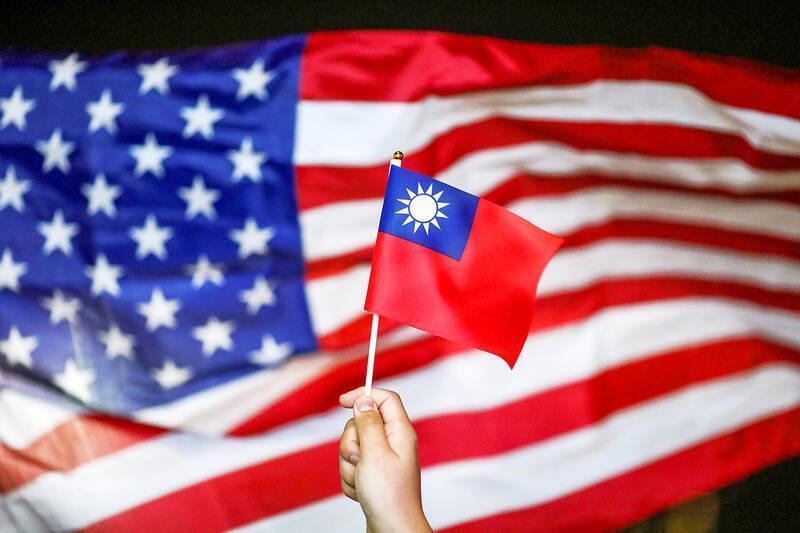The US House of Representatives yesterday passed two Taiwan-related bills aimed at easing limits on bilateral engagement and supporting Taiwan's participation in international organizations.
The first of the bills, the Taiwan Assurance Implementation Act, would require the US Department of State to conduct periodic reviews of its guidelines for US engagement with Taiwan and Taiwanese officials.

Photo: Reuters
It would also require the department to report to US Congress every two years on the guidelines, and "identify opportunities to lift any remaining self-imposed limitations on US-Taiwan engagement and articulate a plan to do so."
The legislation, which was introduced in February by Republican US Representative Ann Wagner and Democrats Gerry Connolly and Ted Lieu, was passed by a voice vote. It would need to be approved by the Senate and signed by US President Donald Trump to become law.
After severing ties with Taiwan in 1979, Washington developed guidelines to limit official interactions with the nation to avoid angering the People's Republic of China (PRC), which sees Taiwan as part of its territory.
These guidelines have included banning senior US executive branch officials, including high-ranking military officers, from visiting Taiwan, while also blocking Taiwan's top leaders from traveling to the US.
Also, meetings between officials from the two sides have had to meet a list of requirements, such as being held at venues other than in official federal buildings or asking Taiwanese officials not to wear any official uniforms or insignia.
Former US secretary of state Mike Pompeo removed the guidelines in the final month of Trump's first term as president, but many were later put back in place during the administration of former US president Joe Biden.
The second piece of legislation consists of amendments to the TAIPEI Act of 2019, which instructs the US government to support Taiwan's membership in international organizations and encourage other countries to strengthen their official or unofficial ties to Taiwan.
The new bill, called the Taiwan International Solidarity Act, would add language to "clarify" that UN Resolution 2758 did not address the issue of the representation of Taiwan or its people in the UN or related organizations.
Approved in 1971, UN Resolution 2758 recognized the PRC as the only legitimate government of China, and expelled "the representatives of Chiang Kai-shek (蔣介石)." Chiang was the then-leader of the Republic of China, which governs Taiwan.
The bill would also expand reporting requirements in the TAIPEI Act to include information on China's efforts to undermine Taiwan's international participation and its ties or relationships with other countries.
Versions of both the bills approved yesterday were previously passed by the US House of Representatives in 2023, but were not taken up by the Senate, and thus had to be reintroduced after the new Congress was seated on Jan. 3.

Chinese spouse and influencer Guan Guan’s (關關) residency permit has been revoked for repeatedly posting pro-China videos that threaten national security, the National Immigration Agency confirmed today. Guan Guan has said many controversial statements in her videos posted to Douyin (抖音), including “the red flag will soon be painted all over Taiwan” and “Taiwan is an inseparable part of China,” and expressing hope for expedited reunification. The agency last year received multiple reports alleging that Guan Guan had advocated for armed reunification. After verifying the reports, the agency last month issued a notice requiring her to appear and explain her actions. Guan

GIVE AND TAKE: Blood demand continues to rise each year, while fewer young donors are available due to the nation’s falling birthrate, a doctor said Blood donors can redeem points earned from donations to obtain limited edition Formosan black bear travel mugs, the Kaohsiung Blood Center said yesterday, as it announced a goal of stocking 20,000 units of blood prior to the Lunar New Year. The last month of the lunar year is National Blood Donation Month, when local centers seek to stockpile blood for use during the Lunar New Year holiday. The blood demand in southern Taiwan — including Tainan and Kaohsiung, as well as Chiayi, Pingtung, Penghu and Taitung counties — is about 2,000 units per day, the center said. The donation campaign aims to boost

The Kaohsiung Tourism Bureau audited six hotels in an effort to prevent price gouging ahead of Korean band BTS’ concert tour in the city scheduled for Nov. 19, 21 and 22 this year. The bureau on Friday said that the audits — conducted in response to allegations of unfair pricing posted on social media — found no wrongdoing. These establishments included the local branches of Chateau de Chine, Hotel Nikko, My Humble House, and Grand Hai Lai, it said, adding that the Consumer Protection Commission would have penalized price gougers had the accusations been substantiated. The bureau said the Tourism Development Act

BACK TO WINTER: A strong continental cold air mass would move south on Tuesday next week, bringing colder temperatures to northern and central Taiwan A tropical depression east of the Philippines could soon be upgraded to be the first tropical storm of this year, the Central Weather Administration (CWA) said yesterday, adding that the next cold air mass is forecast to arrive on Monday next week. CWA forecaster Cheng Jie-ren (鄭傑仁) said the first tropical depression of this year is over waters east of the Philippines, about 1,867km southeast of Oluanpi (鵝鑾鼻), and could strengthen into Tropical Storm Nokaen by early today. The system is moving slowly from northwest to north, and is expected to remain east of the Philippines with little chance of affecting Taiwan,